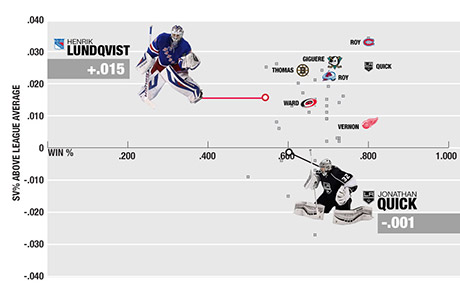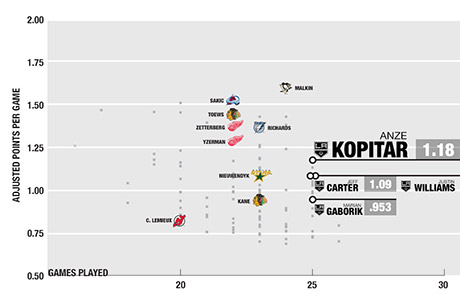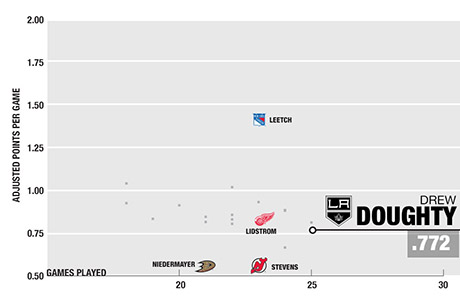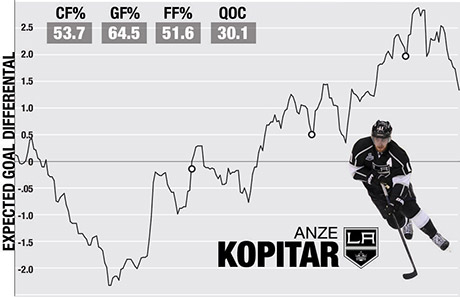Every season there seems to be great debate as to who will win the Conn Smythe trophy, with power rankings that begin after just a couple of games. That early, it’s surely premature, but if we didn’t do early ranking we would never hear the words “San Jose Sharks” and “Conn Smythe” in the same sentence.
Players jump in and out of contention and everybody has an opinion up until the Stanley Cup is finally presented. Media and fans argue, but it is generally fairly predictable who will actually be named the playoff MVP, based on historical precedent. Nine out of ten times the winner comes from the Stanley Cup–winning team. So when a team like the Kings jumps ahead 3-0 we start to peruse their roster for candidates.
Generally the search begins with the goaltender, because they have won the award 33 percent of the time. The Kings have a Conn Smythe–winning goaltender on their roster, but he has been mediocre to bad all playoffs.This is where the debate really begins this season, because over the last 20 seasons, a post-season like Quick’s registers so poorly that he is not even a realistic candidate.
Outside of Brodeur being snubbed for Claude Lemieux in 1995 (+.034), if a goaltender registers an elite save percentage during a Cup winning season, they generally walk away with the Conn Smythe. Brodeur has been snubbed twice, the other being with probable cause (Giguere +.026 in 2003), while Ed Belfour was snubbed for Nieuwendyk in 1999, a post-season where a legit argument could have been made for Hasek. If the Rangers pull of their miracle comeback Lundqvist is a lock to win the trophy.
Chris Osgood lost out in 2008 during a strong statistical run, but he was defeated by the second-most obvious Conn Smythe selection: the forward who leads the league in scoring for the Cup winning team. In that case it was Henrik Zetterberg put together a strong run for the Wings. Scorers who put up elite point per game stats are rarely overlooked unless they come head to head with the elite goaltender performance (Ward>Staal in 2006) or, of course, are outscored by a teammate (Malkin>Crosby in 2009).
What this means is that Anze Kopitar has jumped into contention for the Conn Smythe, not because he is having a history-making playoff run, but because he matches the historical criteria the best at this point. Justin Williams is a dark horse because of the media getting behind the Mr. Game Seven moniker, even though wingers rarely win the award. But hey, as we saw with Claude Lemieux in 1995, Scott Stevens in 2000 and Mike Vernon in 1997 reputations can occasionally take a life of their own during weak years and could result in an award on Williams mantle.
Similar to the Hart trophy, media and fans don’t really know how to assess defenders properly because they rarely dominate statistically. This results in defensemen rarely being awarded the trophy, even though an argument can be made that they are the most important players on the ice. Doughty has recently been the anointed the best player in the league recently by some, as the media has developed a schizophrenic nature of changing this individual every week.
Lead the league in playoff scoring as a defenseman like Brian Leetch and you are a lock for the Smythe, but generally these players vault to the forefront only because a lack of strong options at other positions. Lidstrom won his award during a season where Hasek was league average and Yzerman barely registered a point per game. Same with Niedermayer in 2007 and Stevens in 2000. This opens the door for Doughty’s candidacy. His performance is not far off Lidstrom’s in 2002 and with no obvious winner standing out, he could be a dark horse in 2014.
The 2014 playoffs is also open for the once-in-a-decade losing team player trophy steal. If the Rangers can extend the series to 7 games, Lundqvist might be able to sneak away with the hardware in a field where the lack of leader could easily split the Los Angeles Kings vote. Of the five times the award was given to the losing team, four of those times it has been awarded to a goaltender.
Mr. Game Seven could very easily ride his “clutch” reputation to the Smythe award, but the most deserving King is Anze Kopitar. Not only does he meet the criteria of leading his team in scoring, but he has also managed to dominate traditional and #fancystat categories while facing elite competition.
Kopitar has outperformed his expected output while driving the Kings’ play. His possession numbers are strong considering the match ups he’s face during this Kings playoff run. Kopitar struggled early at 5 on 5 as the Sharks matched him up against Patrick Marleau, Logan Couture and Matt Nieto, but as the series wore on the Slovenian began to take over. When the Kings knocked the Sharks out, his assignment became Ryan Getzlaf, Corey Perry and Devante Smith-Pelly. His task against the Hawks? Jonathan Toews, Marian Hossa and Bryan Bickell. In the Finals it is more of the same.
Kopitar isn’t just negating the top of the other teams’ lineups, he is dominating those match ups. He has always been underrated playing on the West Coast, but I do find it interesting that, after defeating Jonathan Toews—the man that inherited Sidney Crosby’s best player mantle in the Conference Finals—the imaginary belt went right past Kopitar to Drew Doughty. It is possible Doughty steals the Smythe, I can live with that, but Kopitar should win it because it is time he is recognized as a superstar.




